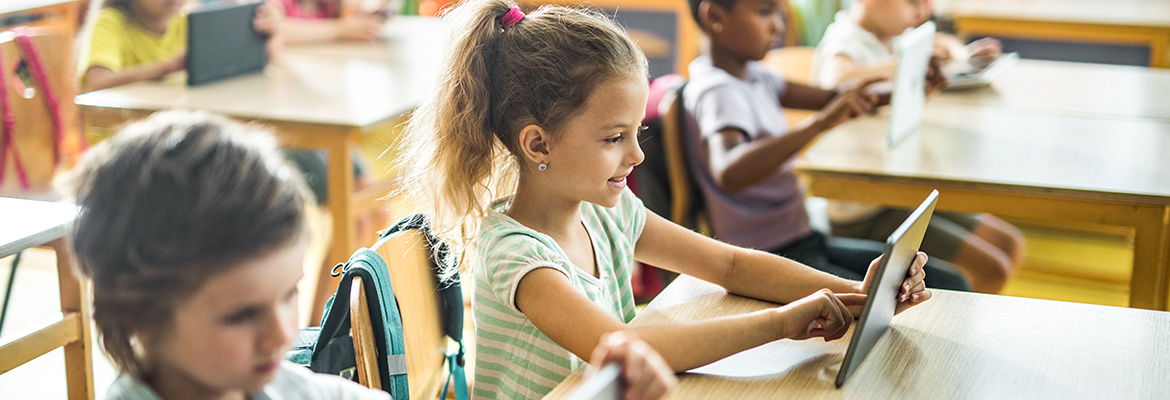7 June 2022
Keeping children safe online: are teachers and parents on the same page?
By Melanie Thomson, Online Safety Representative at RM

One in three internet users is a child under 18 years of age, UNICEF estimates.
While the time spent on online activities can help children develop the necessary digital skills for the modern world, this increased access can also lead to an increase in exposure to online risks.
Thoughts, ideas and activities that were once kept from minors are now easily accessible on the internet thanks to social media and powerful search engines. Now, the possibility of underage children being privy to inappropriate content and contact poses a great risk to their safety in real life.
Ofcom’s annual study into media habits revealed that a third of parents of five to seven-year-olds say their child has a social media profile. And among the eight to 11-year-olds who use social media, the most popular platform is TikTok, with one in every three having an account despite the big three platforms (Facebook, Instagram and Tik Tok) stating that users of their sites must be over 13 years old.
Reports like these are alarming and, from our experience at RM working with schools across the country, we know that as the role of technology accelerated during the pandemic, it’s never been more crucial to protect children from online harms.
In order to explore these concerns, RM commissioned research surveying school leaders, designated safeguarding leads, IT network managers and parents on Keeping Children Safe Online. I’ve highlighted a couple of the most surprising and worrying findings here.
Lack of parental control
According to a 2019 report by Common Sense Media, the average screen time for children between eight and 12 years was five hours a day, and for teens was over seven hours. Unsurprisingly, the exposure to screens grew significantly for much younger children during the lockdowns.
Perhaps even more concerning, Ofcom found that 22% of parents of three to four-year-olds and 38% of parents of eight to 11-year-olds say they would allow their child to have a profile on social media before they reached the minimum age set by the platforms.
RM’s research found that many parents (42%) don’t implement any parental controls on the devices their children have access to, often relying on trust that their child would come to them if they had a negative or risky experience.
With children accessing the internet at an increasingly early age, this poses a huge risk that they could be exposed to disturbing content or groomed online before their parents realise.
Disparity over who’s the biggest ‘influencer’
RM’s research highlighted a disparity between parents and teachers over how influential their respective roles are in keeping children safety online. Whilst 44% of teachers rated the influence of parents as ‘extremely important’, only 23% of parents agreed that their own influence was quite that high. Conversely, 43% of parents rated the importance of the school’s influence as ‘extremely important’ and 40% of school staff agreed.
Does this suggest that parents feel that schools should shoulder more responsibility than they should in educating young people about online safety? Or does it point to a lack of confidence that many parents feel over how to keep their children safe from ever changing social, messaging and gaming platforms? Whatever the reasons for the disparity, it is a huge burden for schools at an already pressured time with continued Covid disruption, ‘catch up’ expectations and an increase in mental health issues across the board.
It takes a village…
Today, children are overconfident in their abilities to pick out truth from fiction, because according to Ofcom’s latest report, only about one in four of those surveyed could spot a fake social-media profile in practice.
So, while many school age children are adept at using technology, the onus must remain on the adults in their life to ensure they use it wisely and safely.
For schools, this means using online filtering and monitoring controls to help shield children from inappropriate content on school devices as well as engaging with parents and carers to share best practice on keeping children safe online at home.
For parents, it’s essential to take advice provided by their child’s school – and other trustworthy sources – and act upon it. In a “new normal” where children are spending more of their time online (for learning, entertainment and even to socialise), it’s critical that schools, parents, carers and online technology providers work together, aligning guidance to best support safe internet usage for children.
This way, all adults can collectively identify potential risks to online safety, which can arise in new government guidance being created that will ensure everyone uses the internet happily, securely and safely.
If you’re interested in learning more about the views of school staff and parents on online safety, read the full Keeping Children Safe Online research report from RM.